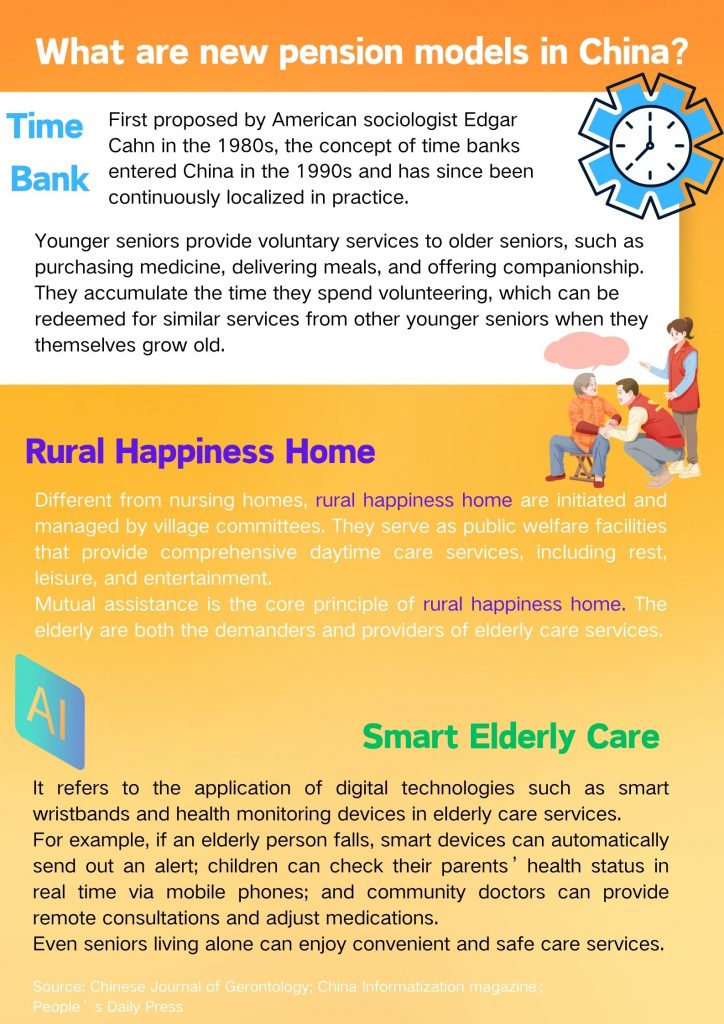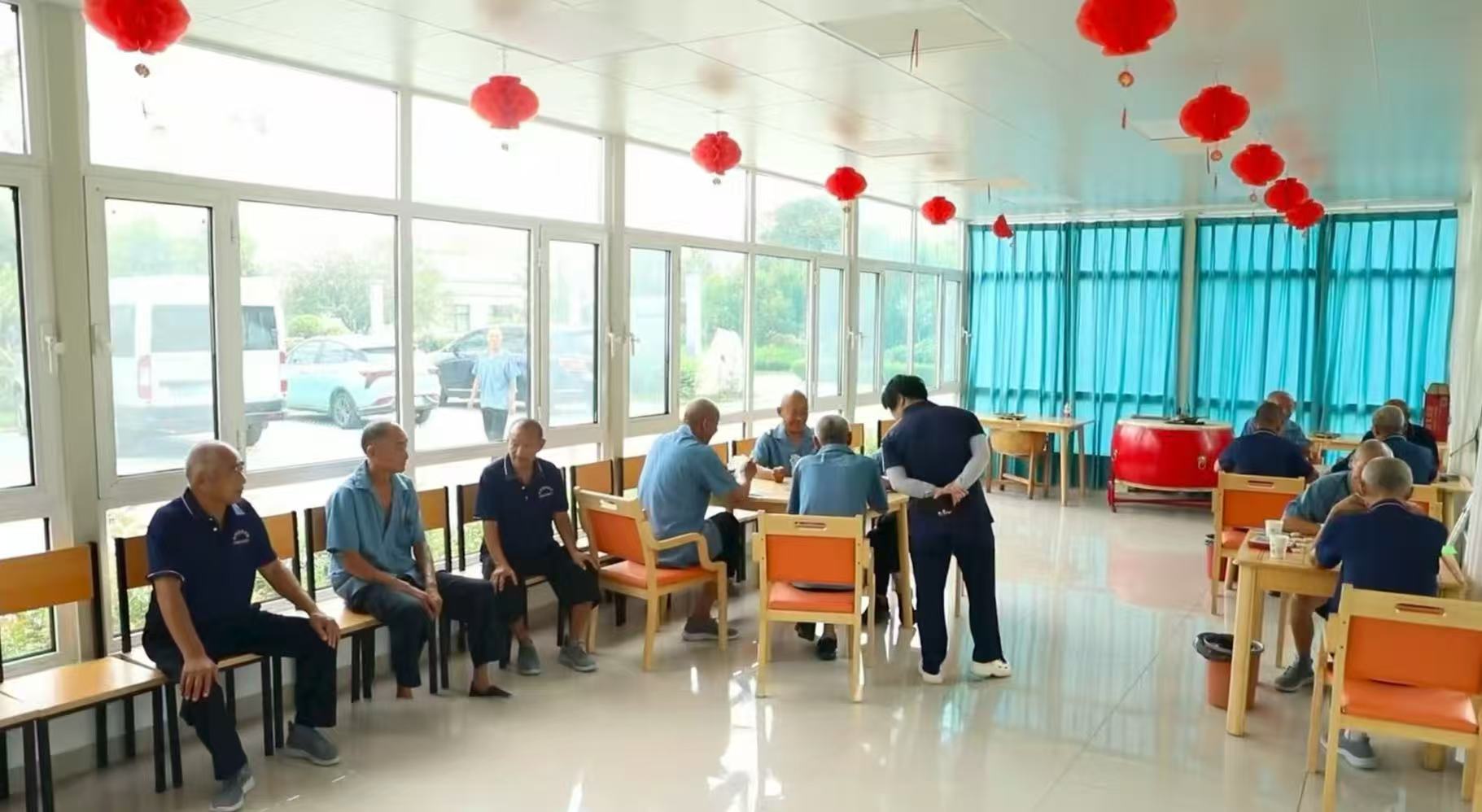Family support alone can no longer provide for the increasing demand for elder care in rural China. What alternatives can support the needs of the rural elderly?
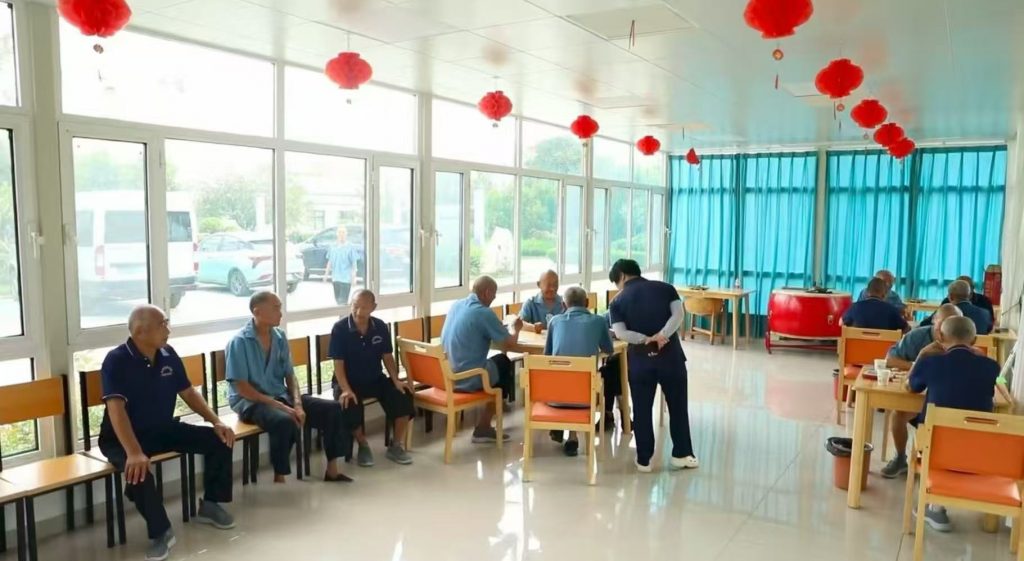
Beyond the gate of the local elder care home lies a quiet square. Under a willow tree, several residents stroke cats and dogs, while others crouch beside the vegetable garden, gently turning the soil to plant a new crop of tomatoes. Nearby, Li Chanling, 25, distributes packets of seeds, offering words of encouragement.
The nursing home in Bijie city, Guizhou Province, covers about 2,000 square meters and has four caregivers. It is a traditional nursing home embedded in the village. Six months ago, Li Chanling, took over its management. Her decision to enter the industry is closely linked to her childhood. She developed a deep attachment to the village, having grown up with her grandparents. Later, she volunteered at a nursing home while at university. Spending time with the elderly during those experiences convinced her to focus on elder care.
There are currently more than 20 residents at the nursing home, with an average age of around 80. “Most are older adults left behind in this village and nearby areas. Some have no children, while others have children who live far away, leaving them without daily support,” said Chanling. “Spending time with them feels just like being with my own grandparents.”
Left-behind elderly in rural China are a group that emerged during the country’s shift from a traditional farming society to a modern industrial one. In their younger years, they relied on agriculture for a living. As their children grew up, many migrated to cities to work, marry, and settle. For financial and cultural reasons, older parents often chose to remain in the countryside. As a result, many are left in rural areas without family support, living alone for long periods.
With the advance of urbanization, left-behind elderly have gradually become a large group in rural China. According to the National Bureau of Statistics of China in 2021, the rural population aged 60 and above had reached 120 million, accounting for 23.8% of the rural population, with over 16 million left behind or living alone.
For Chanling, chatting with the residents has become an essential part of her daily routine. Each morning, she steps into the courtyard to spend time in conversation. “The elderly are nostalgic. They like to recall the past and share stories,” Chanling said.
In the courtyard of the nursing home, Chanling created a small vegetable garden for the residents. She divided it into individual plots, giving each person a piece of land to grow their favourite vegetables. When the cucumbers, tomatoes, and beans ripen, she joins them for the harvest.
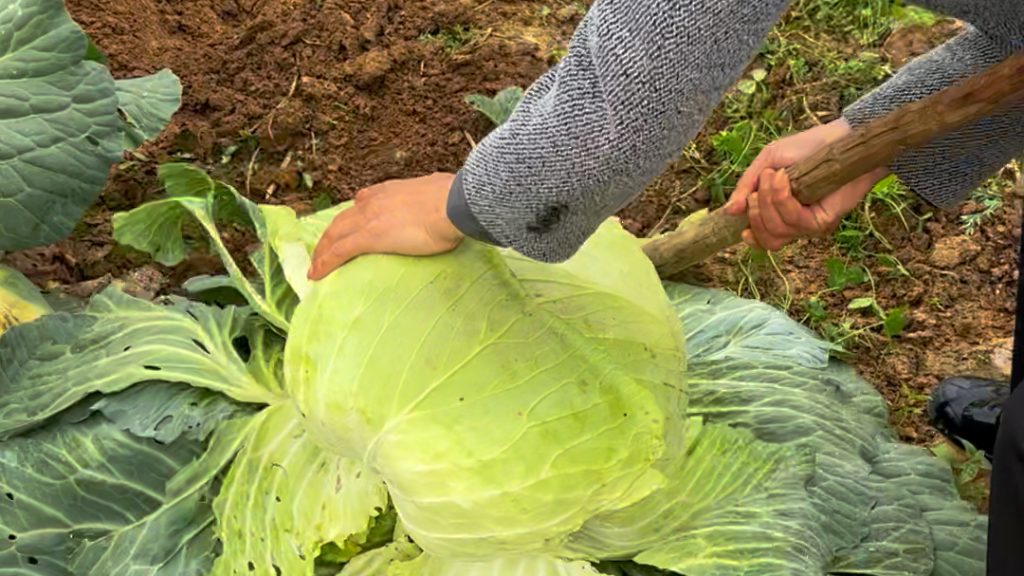
“They all used to farm and don’t like to sit idle, even in old age. I bought different kinds of seeds so we could plant vegetables together. When the crops are ready, we cook and eat them. It gives the residents a real sense of accomplishment,” she said.
Loneliness is widespread among older adults in rural areas, particularly those who are left behind or live alone. With family members absent for long periods, they lack emotional companionship in their daily lives. Many bear life’s burdens on their own, leaving them especially vulnerable to depression and other mental health problems.
According to the Fifth Sampling Survey on the Living Conditions of the Elderly in Urban and Rural China, 7.9% of older adults in rural areas showed moderate to severe depressive symptoms, 3.2% higher than their urban counterparts.
Li Yu, a researcher with fieldwork experience in rural Anhui, said emptiness are common among older adults, especially those whose children work far from home. “When older adults join social activities, they have more to talk about with others. It can ease their loneliness,” Yu said.
Research led by Li Zhonglian at Guizhou Medical University found that social support from family, friends and community groups is vital for active aging. It helps reduce life pressures for elderly people and enhances their sense of well-being.
Li Wei, 44, is a caregiver at a rural nursing home in Shandong province. She said most residents moved in because their children live far away and cannot provide daily care. At the home, however, the residents are of a similar age and find plenty of common ground to talk about.
“The elderly like spending time together. After breakfast, some play cards while others sit and chat,” she said. “We also organise group activities, such as film screenings for them to watch together.”
Wei said gaining the trust of the older adults is the most important thing. When Wei first arrived at the nursing home, she was not familiar with the residents. By helping with daily chores and spending time with them, she gradually gained their trust. “Once they got to know me, they treated me like their own child and were keen to talk,” she said.
Research by Professor Shangjun Feng at Yantai Nanshan University and Yashuo Chen at Yanshan University shows that social interaction is one of the main factors affecting the mental health of older adults in rural areas. They also found that social activities give older people a platform to connect with others. Such interactions can strengthen ties and reduce loneliness.
For many residents, the nursing home has become a source of daily support. It helps ease their sense of isolation, whether through chatting or working in the vegetable garden.
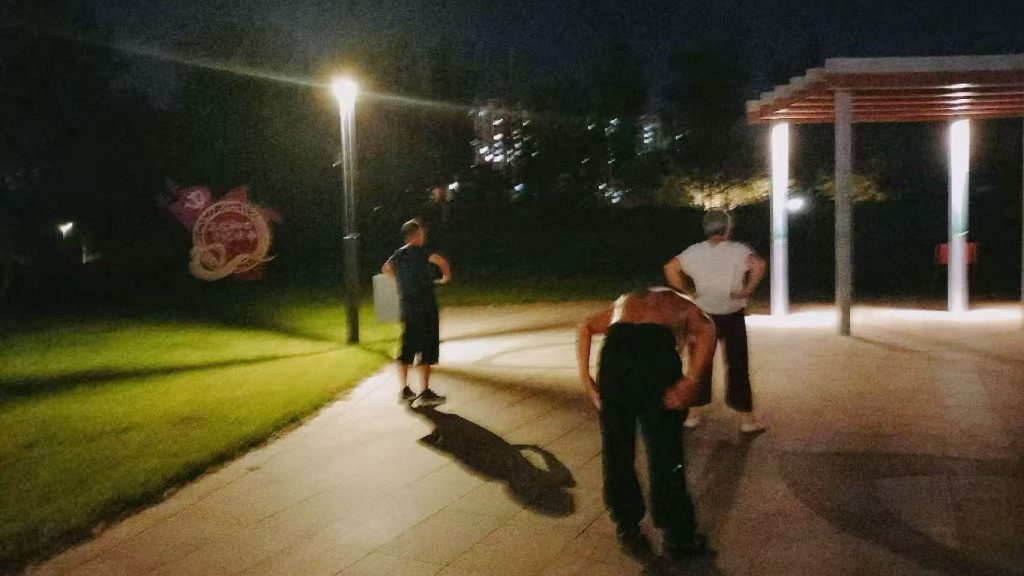
On sunny days, residents play badminton, sit in the sun or play Chinese chess in the courtyard. During traditional festivals, the kitchen staff cook dumplings or make zongzi. “On holidays, the kitchen prepares a few extra dishes and everyone eats together,” Chanling said. “They like drinks such as Sprite and Coke. But because of their age, I sometimes have to limit how much they have and stop them from drinking every day.”
“Most of the residents at the nursing home are in advanced age and generally in poor health. Some can look after themselves, washing, bathing and dressing without help. Others are unable to care for themselves and need assistance. For example, caregivers help feed them. Many of the residents have high blood sugar or high blood pressure, so we check and record their levels every day. We also arrange a full physical examination once a year,” Chanling said.
According to the China Ageing Industry Development Report, by the end of 2022, about 44 million elderly people in China were fully or partly disabled. As the population ages, the demand for elder care continues to rise.
However, medical resources in rural areas are limited, and many elderly people do not place much importance on their health. Some lack the means or awareness to undergo regular checkups. Even when health problems arise, they may choose to endure them or feel reluctant to seek treatment.
“One of the male residents, 91, is a bit naughty and doesn’t always follow instructions. I once noticed a small lump on his leg that didn’t look right, so I took him to the hospital. It turned out to be cancerous cells, and I immediately stayed with him to arrange his admission and surgery,” Chanling said. “About a week after he came back, he didn’t take good care of the wound, and it became inflamed again. He is still under observation at the hospital.”
Good health is essential to ensuring a high quality of life for older adults.To safeguard the residents’ health, Chanling keeps a close eye on their daily care. She lives in the courtyard with the residents, staying on call around the clock. “Every night, we do ward checks every two hours. They are elderly, and we worry about accidents,” she said. “Fire safety checks are also important. For safety reasons, we don’t allow smoking in the rooms.”
In addition to daily care and safety management, Chanling also focuses on the residents’ emotional needs. She said “There are more men than women here. Once, I noticed two men arguing because they were both courting the same female resident. I quietly asked the woman what she thought, and she said she didn’t have feelings for either of them. So nothing came of it.” Chanling said the residents’ tempers are like those of children. One moment they may be arguing, and the next they are back to being friendly, as if nothing had happened.
The need for companionship is common among elderly people in the countryside. Xiaoxia Qin, 22, is a volunteer at a township nursing home in Sichuan Provience. “There is a grandfather and a grandmother at the home who are very close. They have similar personalities, and both enjoy playing Gobang and watching Dream of the Red Chamber and Romance of the Three Kingdoms,” Xiaoxia said. “As volunteers, we only come twice a week to play games and chat with the residents. After we leave, the home becomes quiet again. I think the two of them keep each other company, share their thoughts and feel less lonely.”
According to the research of Sun Xinhua and Song Tao from Huazhong University of Science and Technology , rural older adults have a stronger demand for remarriage than before. They found that as life expectancy increases, single elderly individuals have to spend more time facing life alone. With the companionship of a spouse, older adults are less likely to feel lonely and can gain greater confidence in life.
When older adults live in the nursing home together, friction is inevitable. But it is also part of social life. Through such interactions, they find their place and strengthen their sense of belonging. In essence, it reflects the feeling of being needed and noticed.
“One time, I left my keys in the office on the second floor and couldn’t get them out. So I went to a neighbour’s house to borrow a wooden ladder. It was tall and heavy, and I couldn’t carry it any farther once I reached the nursing home gate. An elderly resident saw me and picked it up to carry on. I wanted to help him, but he said it was so heavy that I didn’t need to.” Chanling said.
Chanling said that although she is the director of the nursing home, the residents treat her like their own child. “Sometimes when I go out and come back to my office, I find food on the table. The residents had bought it for me when they went to the market,” she said.
Compared with nursing homes in cities, those in rural areas lack advanced facilities and professional management teams. But they provide a familiar living environment. A shared language, dietary habits and local ties create a relaxed atmosphere and a stronger sense of belonging. In such a setting, the elderly are not only recipients of care but also active participants in daily life.
With the continued outflow of the rural labour force, large numbers of left-behind elderly have appeared in the countryside. Compared with cities, rural areas have fewer elder care resources and weaker social security support. As the traditional role of the family weakens, the demand for rural elder care services continues to rise.
To ensure a happier old age for rural residents, some villages have been exploring new models of elder care. In Xidan village, Zibo city in Shandong province, a “time savings bank” scheme has been introduced. Most of younger seniors aged 60 to 80, provide services for those over 80, from daily care to emotional support. They accumulate working hours through their service, which are credited to a personal “time bank account”. Once they turn 80, they can redeem the points for services of equivalent value.
As the population ages, China is actively working to improve its elder care system. More universities are offering majors in elderly care and service management. The government has introduced policies and increased funding to encourage innovation in care models and improve the service system. The nursing homes where Chanling and Wei work both receive state support and financial subsidies. For rural elderly people with financial or family difficulties, the government provides assistance such as minimum living allowances and medical insurance to cover basic living and healthcare needs.
“Some of the residents know how to use smartphones. When they want a change of taste, they order food online and often save some for me when it arrives,” Wei said. “When I change shifts, I sometimes make rice balls or steamed buns at home and bring them for the residents. Relationships go both ways, if you treat the elderly well, they will treat you well too.”
For people in their later years, what they crave most is not material comfort but emotional companionship. Their idea of happiness is simple. It is to have someone by their side and willing to listen. “I am planning to keep saving money to build a sunroom for the elderly. They can grow the flowers and plants that they like,” Chanling says.
